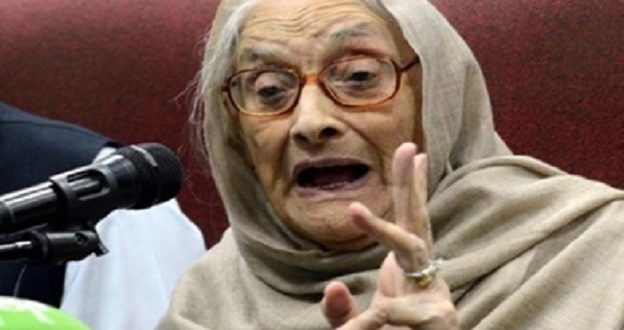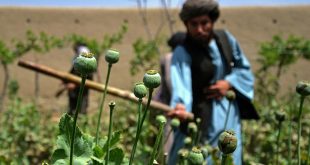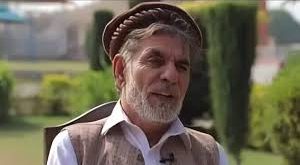By Shamim Shahid
Though Begum Nasim Wali Khan from last several years due to her health conditions remain inactive in politics but she had dominated not only Awami National Politics but even she was remembered and quoted with positive words for her faith and belief in democracy, her just struggle for the supremacy of parliament, independence of judiciary along with independent and autonomous status of the federating units. After her marriage with great nationalist politician Khan Abdul Wali Khan, she had confined herself to domestic matters like other Pushtoon women but was compelled to jump into hazardous field of politics when her husband Khan Abdul Wali Khan along with over 50 leading figures of now defunct National Awami Party locked in Hyderabad Prison, son Asfandyar along with over one dozen locked after inhuman tortures in Hayat Muhammad Khan murder case, hundreds of other NAP stalwarts from all over the country have been imprisoned in almost prisons and cells throughout the country and younger brother Azam Khan Hoti along with thousands of others under t he command of Ajmal Khattak were on exile in neighbouring Afghanistan. Begum Nasim Wali Khan with black-color Dopatta on head came out in public demonstrations against the then Pakistan People’s Party government of late Prime Minister Zulfikar Ali Bhutto. Challenging late Z A Bhutto government, Begum Nasim Wali Khan in mid of 1975 while addressing public gatherings of National Democratic Party has made it clear. “ this black dopata will remain on head till ending of Z A Bhutto regime,” and she did. Even her landing in politics had encouraged others politicians like late Maulana Mufti Mahmood, Nawabzada Nasar Ullah Khan, Pir of Pagara Syed Mardan Ali Shah, Prof. Ghafoor Ahmad, Malik Muhammad Qasam, Shah Ahmad Noorani and others for entering into an alliance which was later named as Pakistan National Alliance. No doubt to mention that at later stage the PNA was hijacked by anti-democratic forces for meeting its nefarious designs but the PNA not only in the country but throughout global history remain a result-oriented opposition alliance against any government. Earlier after debacle of Dhakka, late Khan Abdul Wali Khan had served as opposition leader in National Assembly and had extended maximum support to late Z A Bhutto in handling the issues erupted after disintegration of Pakistan in 1971 and in framing of 1973 Constitution. But after passage of 1973 Constitutions, the anti-democratic forces become alert and initiated efforts of making isolated no other than first elected Prime Minister Z A Bhutto. Such anti-democratic elements succeeded in their task by fuelling anger and hostilities of late Prime Minister with Pushtoon and Baluch nationalists, which was in real terms lead to creation of PNA. And finally, the anti-democratic process succeeded in derailing of political democratic process and imposed Martial Law under the command of Gen. Zia Ul Haq. No one can deny the fact that due to “hostilities or enmity like treatment at hands of Z A Bhutto, the NDP-considered continuation of now defunct NAP had welcomed “ending of Z A Bhutto regime” but almost of its (NDP) leaders and workers remained unhappy with derailing of democratic process. And on such grounds, the NDP was first disassociating itself from PNA when leaders of its some components decided of becoming part of Zia Ul Haq Martial Law regime by accepting ministerial offices. During that period, Z A Bhutt along with other close relatives and aides were in prisons. And no other than NDP leaders were first in denouncing military regime’s acts and actions against PPP leaders-which lead to making close the two sides and also towards establishment of another opposition alliance Movement for the Restoration of Democracy (MRD). And from the MRD platform, the two sides succeeded in easing the over decade tensions and hostilities. But unfortunately all such achievements ruined when in 1989, the ANP ministers have been forced to quit when former Chief Minister Aftab Ahmad Khan Sherpao inducted almost of opposition Islami Jamhoori Ittehad MPA’s in his cabinet without consulting his allies from ANP. Besides, PPP leadership allegedly helped in motivating of self-styled communists in establishing the Quami Watan Party just to destablise the ANP. Begum Nasim Wali Khan had lead the ANP or made contribution in politics at a very crucial time. On one side, due to war against former USSR from the soil of Afghanistan, Pakistan’s military establishment and its obedient political parties and groups on one side and certain military-establishment loyal elements on the other were didn’t sparing any chance of damaging the ANP-considered most popular nationalist political force-insisting on ending war and settling the conflict in Afghanistan through peaceful and political means, She through one or the other ways made glorious successes in foiling all such
 Afghanistan Times
Afghanistan Times




